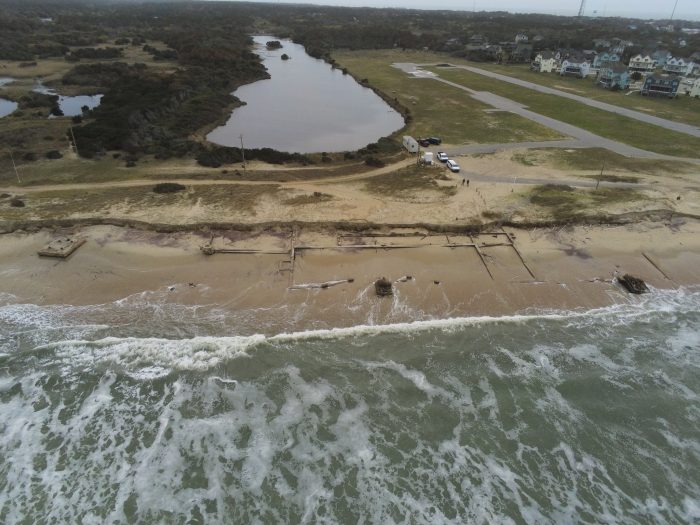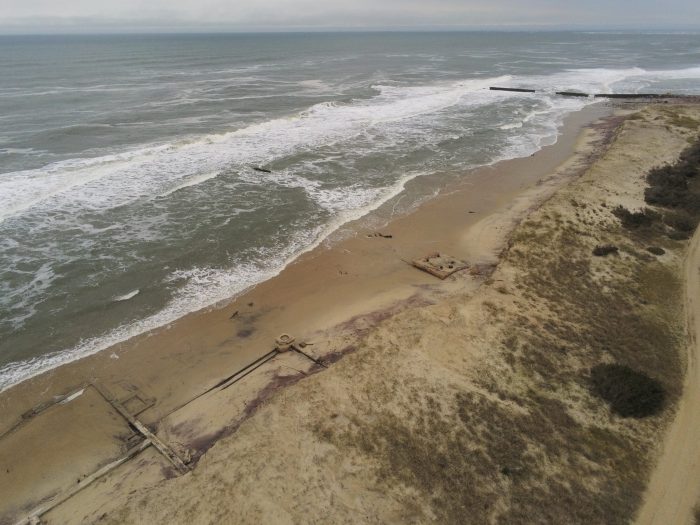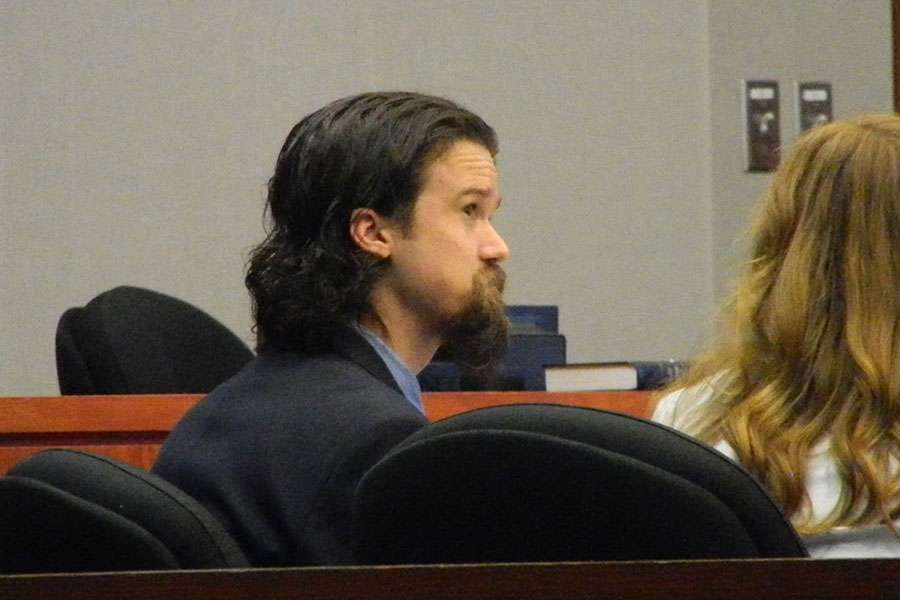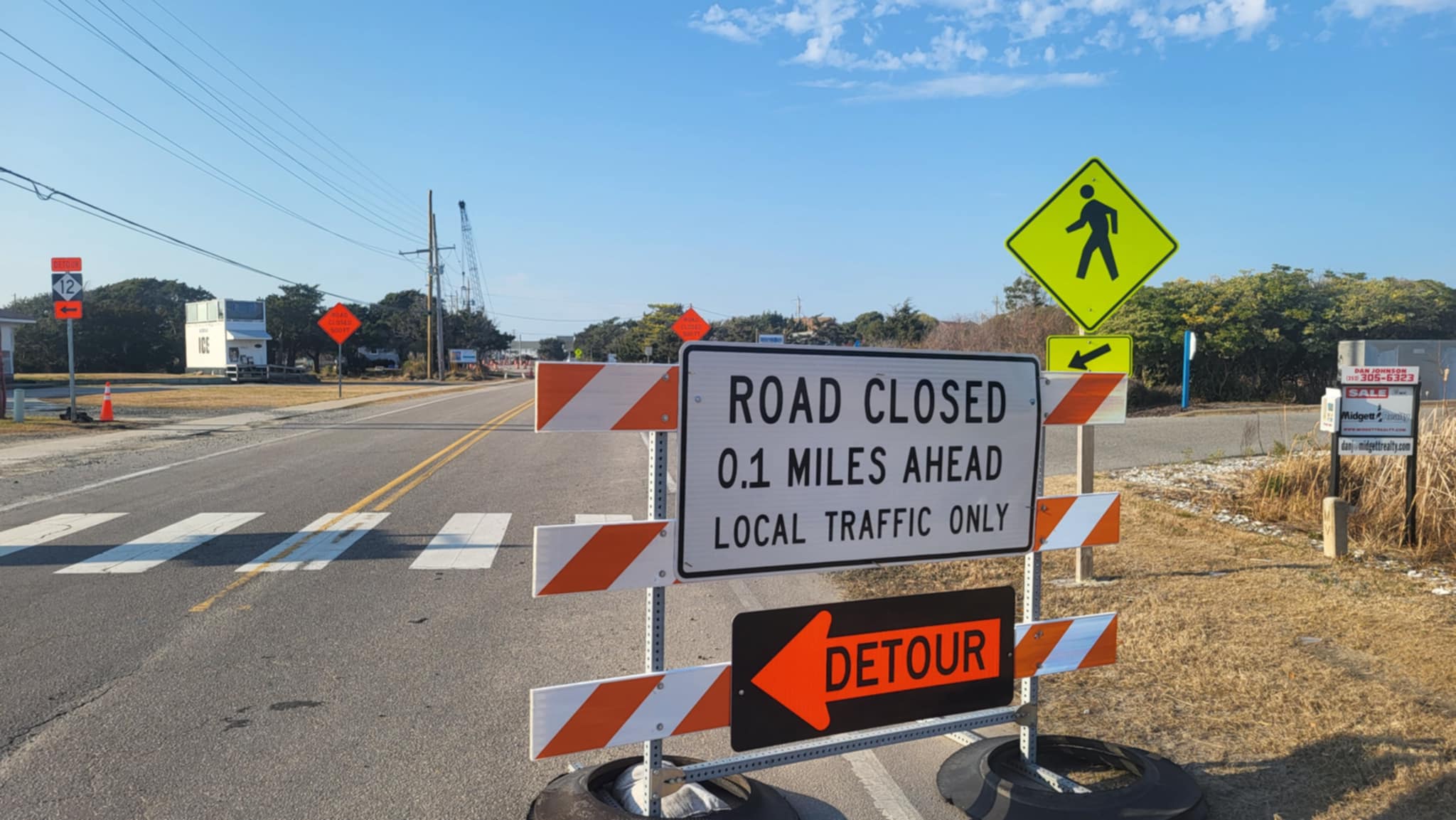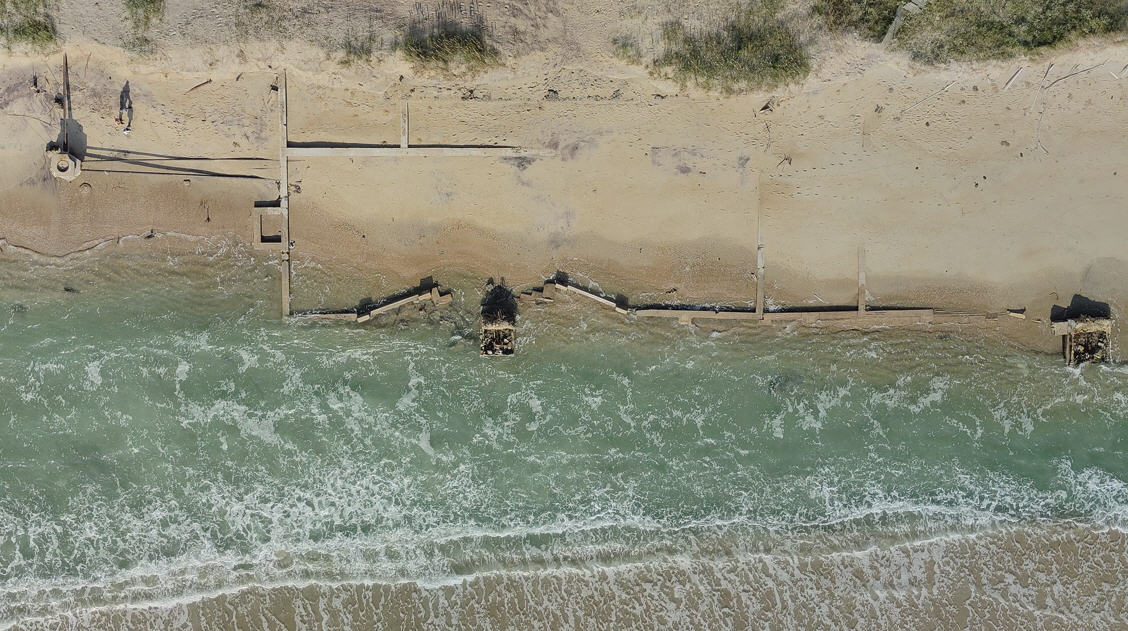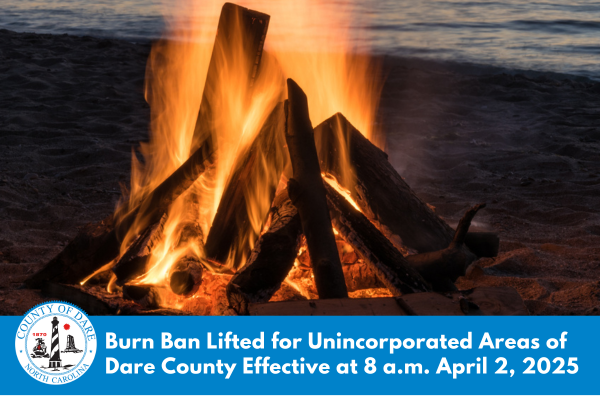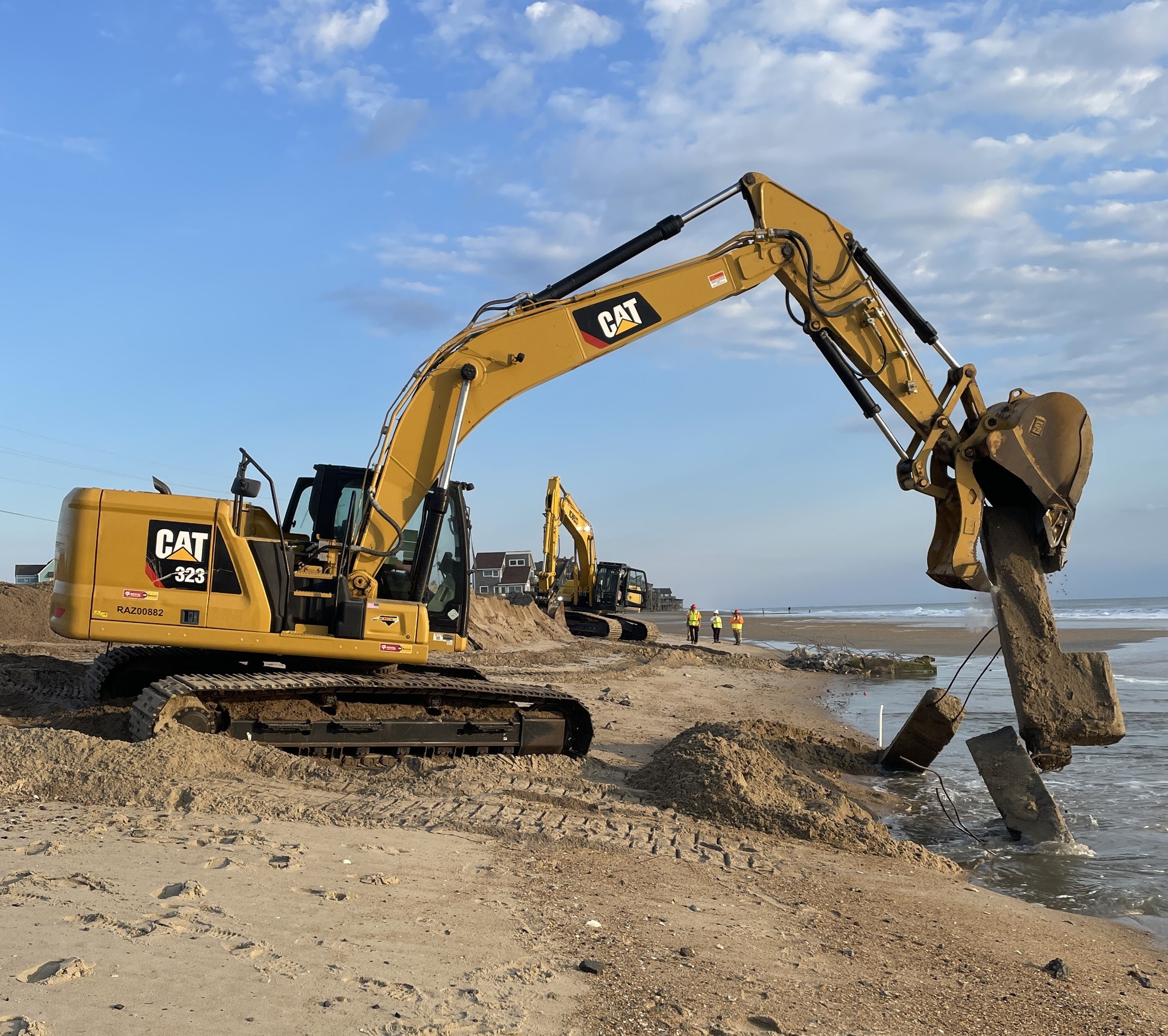Buxton Civic Association will host its first meeting on April 10 to discuss the environmental and public safety issues at Buxton Beach
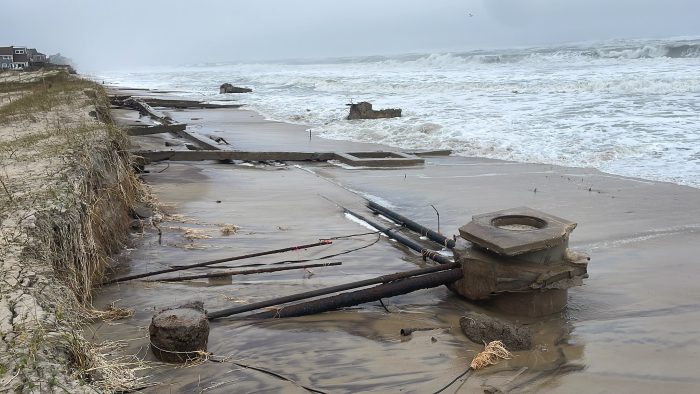
The recently established Buxton Civic Association (BCA) will host its first-ever public meeting on Wednesday, April 10, to discuss the evolving situation at Buxton Beach, as well as the next steps for facilitating action to clean up petroleum-contaminated soils, abandoned infrastructure, and other pollutants in the area.
Wednesday’s meeting, (which will be held at the Fessenden Center at 6 p.m.), will include an introduction to the new BCA board members, as well as a presentation by Cape Hatteras National Seashore (CHNS) Superintendent David Hallac that was initially shared with the community on March 27.
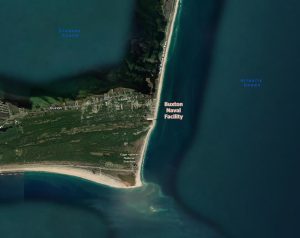 During the presentation, Superintendent David Hallac will outline the history of the military site, the agencies involved in potential clean-up efforts, and what has happened over the last six months as the issues have grown.
During the presentation, Superintendent David Hallac will outline the history of the military site, the agencies involved in potential clean-up efforts, and what has happened over the last six months as the issues have grown.
A roughly 500-yard stretch of beach at the end of Old Lighthouse Road has been closed to the public since September 2023 after two offshore hurricanes caused a wave of environmental and public safety issues to resurface.
The site of the contaminated shoreline was the former home of a Navy Base from 1956 until 1982, and a U.S. Coast Guard base from 1984 until 2010, and both military branches effectively used the site under the condition that the shoreline would be returned to its pristine National Seashore condition once the bases had been decommissioned.
The consensus among stakeholders is that the U.S. Army Corps of Engineers (Corps) and the U.S. Coast Guard are responsible for different aspects of the massive clean-up required, based on their individual connections and usage of the area. The Corps is responsible for cleaning up the petroleum smells and exposed structures on the beach, while the Coast Guard is responsible for a separate issue of pesticides and PCBs, (manmade organic chemicals consisting of carbon, hydrogen, and chlorine atoms).
Clean-up initiatives by both agencies have been conducted before. In 1998, the Corps approved the Buxton Beach area as a Formerly Used Defense (FUDS) site, which paved the way for the Corps’ remediation efforts, including the removal of abandoned structures and 4,006 tons of petroleum-contaminated soils (PCS). Meanwhile, the Coast Guard removed additional structures as well as some of the wastewater facilities in the 2010s.
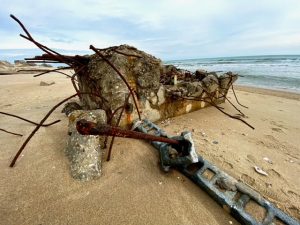
However, not all the infrastructure, debris, and contaminated soils were fully removed, as evidenced by the now-prevalent issues that have become an accelerating problem for more than six months.
In late October 2023, after these hazards resurfaced, the U.S. Army Corps of Engineers Savannah District announced that they were working on investigative efforts to determine “any necessary corrective actions” under the umbrella of the FUDS program. However, in February 2024, (and after a months-long investigation), the Corps stated that they could not find a direct source of petroleum, so they would be unable to conduct clean-up efforts.
A press release was issued on March 27 that outlined the results of the Summary Report from the Corps’ visits to the site from September 2023 through February 2024.
“The Army Corps of Engineers will continue working with its partners to assess whether recently reported contamination is linked to DoD activities prior to 1986,” stated the March 27 press release. “However, remedial action using the FUDS Program is not authorized due to an unknown source. Additionally, the concrete structures that were uncovered after years of erosion on the beach were not associated with the petroleum or the initial cleanup of the area that occurred in the 1990s, which also means those remnants are currently ineligible for removal under the FUDS Program.”
This inaction has caused a growing public response, as well as the formation of the Buxton Civic Association.
One of the first objectives of the BCA will be to investigate the formation of a Restoration Advisory Board (RAB), which creates a line of communication between local communities and the agencies responsible for cleaning up sites that were previously used by the Department of Defense (DoD).
According to a 2007 RAB Handbook, a military installation (or site) will form an RAB when there is significant community interest, and one of the following conditions apply:
- The installation is closing and transferring property to the community
- Federal, tribal, state, or local government representatives have requested a RAB
- The installation has determined the need for a RAB
- At least 50 local citizens have petitioned for a RAB
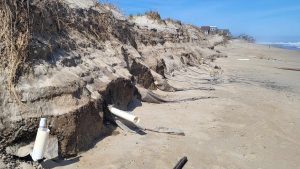
“Buxton is eligible [for the formation of a RAB], and given the level of community interest, the U.S. Army Corps of Engineers, Savannah District, is mobilizing its resources to establish a Restoration Advisory Board,” stated Cheri Pritchard, Media Relations Chief for the Corps’ Savannah District, in an April 2 email to the Island Free Press. “The District team is following the established policies and procedures regarding RAB formation. A timeline will become more apparent as we progress through the steps.”
According to the 2007 Handbook, there is no set timeline for RAB establishment, but it “typically takes four to six weeks to notify the community, approve membership, and create operating procedures.”
“When I talked to everyone in Buxton, no one had ever heard of [RABs],” said BCA Board Member Brian Harris in an earlier interview. “It’s a mystery how it slipped through the cracks for so long, when it has been there for 30 years. No one in Buxton was notified of the program, and there’s no excuse for that.”
The BCA is in the early stages of identifying the best routes toward long-term solutions, but in the meantime, local and on-the-ground agencies have been working to share as much information as possible about the closed Buxton Beach shoreline.
CHNS launched a new webpage explaining the history of Buxton Beach in late February, while the Dare County Department of Health and Human Services issued a revised Public Health Advisory for the area in late March, after the closure was expanded from two-tenths to three-tenths of a mile on March 24.
In addition, resolutions and public statements advocating for clean-up efforts have been made by multiple organizations, including the Dare County Board of Commissioners and the Outer Banks Chamber of Commerce.
Stakeholders and the nine new BCA Board Members are hoping that attention and continual community involvement will help move an issue that is seemingly at a standstill.
“The biggest thing is that we need to get this information out there, and people need to start pushing this,” said Harris in an earlier interview. “A lot of people are scared of how this will affect the tourist season, but people need to start standing behind this issue and waking up, because it’s not looking real good right now. People need to put their opinions to work, and come out and help.”
For more information, and how to get involved:
- The first meeting of the Buxton Civic Association will be held on Wednesday, April 10, at 6:00 p.m. at the Fessenden Center in Buxton.
- The Civic Association is in need of a website and social media consultant who can help build the organization’s online presence. To assist, contact Brian Harris at 252-489-9669 or via Facebook at https://www.facebook.com/buxtonnccivicassociation.
- The public can also join the ongoing email and letter-writing campaign, which was launched in mid-March by Buxton community members.
- Visitors who encounter a fuel smell or fuel sheens while visiting the Buxton shoreline near Old Lighthouse Road should call the National Response Center at 1-800-424-8802 to report the encounter. Include the date, time, location, and basic details of what was seen or smelled, and do not call if you have not experienced the issue first-hand, or have not been physically affected.
- Remember that while the environmental issues at Buxton Beach are considered to be a growing emergency, just three-tenths of a mile of the shoreline is closed, out of 75 miles of National Seashore. In short, the public can still visit and enjoy Buxton, and Hatteras Island in general.
To view the Island Free Press’ recent coverage of this developing story, refer to the articles below:
- “No immediate solution in sight for Buxton Beach” – Published on February 19
- “CHNS launches new web page on Buxton Beach’s history and current environmental issues” – Published on February 25
- “Sounding the alarm for Buxton Beach” – Published on February 27
- “Dare County Board of Commissioners take a united front on the issue of Buxton Beach” – Published on March 5
- “Local officials are taking steps to warn the public about Buxton Beach while investigations continue” – Published on March 8
- “National Seashore temporarily expands beach closure at Buxton Beach Access due to petroleum odors and sheen on water” – Published on March 24
- “Dare County issues new Precautionary Public Health Advisory for Buxton Beach” – Published on March 25
- “Understanding the issues at Buxton Beach – An FAQ Guide” – Published on March 25
- “Corps of Engineers completes report on Buxton Beach contamination” – Published on March 27
- “Hatteras Islanders launch campaign to initiate immediate action at Buxton Beach” – Published on March 28
- “Frustrations simmer at public meeting on Buxton Beach” – Published on March 28
- “Outer Banks Chamber of Commerce requests immediate action at Buxton Beach” – Published on April 1
- “New Buxton Civic Association launched to facilitate action at Buxton Beach”– Published on April 2
